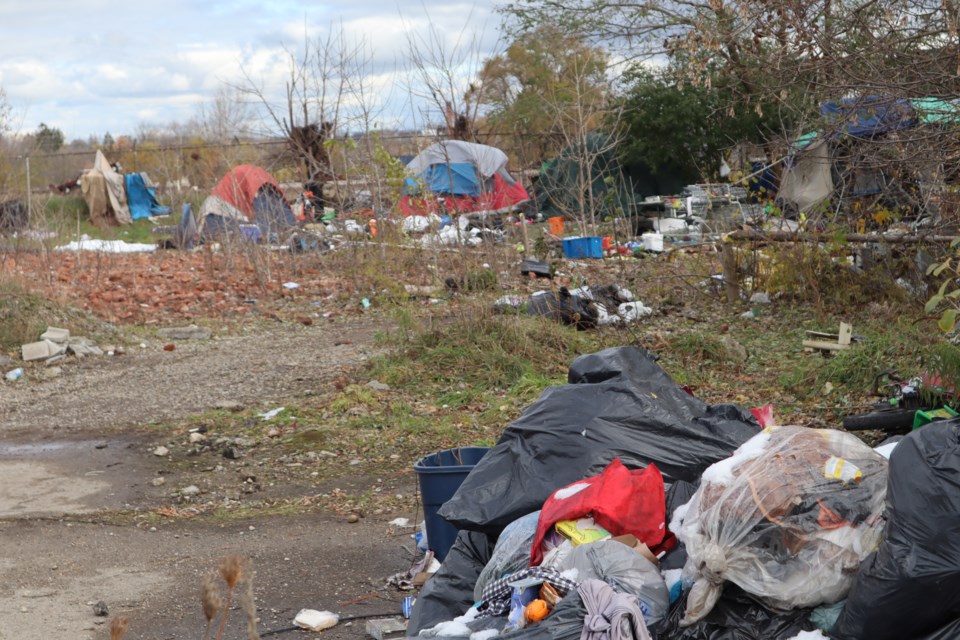A growing trend in Cambridge and Waterloo region is the homeless encampments that are popping up.
According to police there are over 90 encampments in the Waterloo region. After a string of incidents over the past couple of weeks, these camps and the people inside them have been put in the spotlight.
In a small encampment in the Elgin Street area, about five individuals live in tents located next to a path.
CambridgeToday agreed not to use their names for safety concerns.
“We don’t have anywhere else to go,” said one of the residents. “We’re not all bad people, we just want to live our lives.”
According to Cambridge mayor Kathryn McGarry, this is more than just a city issue.
“We really need all of our government partners at the table to work with us and that really includes our provincial and federal partners as well,” said McGarry.
She called for more services provided by higher levels of government to help bolster Cambridge’s ability to house and support the city’s unsheltered population.
The residents of the camp agree with McGarry and want to see better service mechanisms put in place to help those on the street.
“The system we have now sucks, I can’t get anywhere to take a shower or get a meal,” said one of the residents.
According to McGarry, these camps are a direct result of the growing homeless population and the lack of housing and support for individuals who find themselves unsheltered.
“The main issue that is causing this is homelessness, mental health and addiction issues. So the only way to end homelessness is by building more housing and offering more supportive housing options that allow individuals, especially those with mental health and addiction issues to actually maintain their housing,” said McGarry.
Police chief Bryan Larkin spoke at a police board meeting last week and discussed some of the issues surrounding these camps.
“Encampments are a very complex issue, there's no simple answer,” said Larkin. “I think one of my concerns as a public safety leader is that encampments generally are not safe.”
Larkin points to various reasons why these impromptu camps can be potential hazards. He said, the lack of fire safety and support systems in these camps can be dangerous to those living there and to surrounding neighbours.
A fire broke out at an encampment close to the 401 near Hespeler Road a few weeks ago and the property owner, TC Energy, is ready to remove the people living in this camp.
“This is private property and it is not suitable for an encampment for safety and operational reasons,” said the media team for TC Energy. "We continue to collaborate with authorities in determining the next steps to resolve this situation as this encampment is neither safe nor permitted."
When it comes to the removal of these encampments, it can be a very tricky and delicate situation. When a Kitchener camp was bulldozed back in late 2021, the community was up in arms and advocate groups claimed the city was violating basic human rights.
“I always have the question of where are we moving them to?” asked Larkin.
Not only is there a question of where will the unsheltered residents go, but who is responsible for damage caused by a camp on private or city owned property?
Bill Schwarz is a corporate lawyer with PSH law in Cambridge and he said liability lands in the hands of the property owner.
“If the owner, whether that be a private company or the city, is not doing their part and making sure there aren’t any trespassers on their property, they can be held liable for damages to other property owners,” said Schawrz.
There are several camps on city and region-owned land, like the one off of Elgin Street and more notably the massive camp on region land in downtown Kitchener.
Asked for comment, the City of Cambridge declined to answer questions regarding the city’s liability surrounding encampments.
“If something happened on city property and there was damage to another business or something even worse like injuries, the city could be in deep legal trouble,” said Schwarz.
Larkin said the police have a hard time policing private property and directs any owner with an encampment to obtain a court order to remove these camps.
While the police chief wants to look into the root causes of these issues, he does not support crime and reaffirms his officers are there to protect the community.
“Our officers need to take action. If we get complaints, we'll respond and we'll deal with them,” said Larkin.
Police are working with its regional and city partners to address these encampments and provide the services they need to get into homes and off the streets, but they need more help provincially and federally.
“We need all levels of government working together and we actually need to do this from a very empathetic perspective,” said Larkin. “We also need to recognize that other citizens also want to feel safe and secure in their neighbourhoods and that's a very difficult challenge.”
The relationship between authorities and the un-sheltered has been a shaky one at best for a long time. Residents from the camp off Elgin Street have lost trust in city officials to be able to provide them enough space to live and are unsure if they want to turn back to the system.
“The system is broken, how am I supposed to trust they can help me and I don’t end up back here in a few weeks?” said one of the residents.



